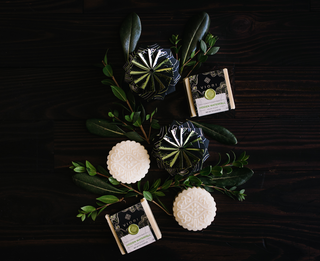When it comes to hair care, navigating the world of ingredients can feel like deciphering a secret code. One group of compounds often surrounded by confusion and misconceptions is natural fatty alcohols. In this post, we'll unravel the myths and shed light on the true nature of these ingredients commonly found in hair products. So, let's embark on a journey to demystify natural fatty alcohols and discover how they can benefit your locks.
What Are Natural Fatty Alcohols?
Natural fatty alcohols are derived from fats and oils, often sourced from plants like coconut, palm, or even animal fats. Despite the name, they are not the drying alcohols commonly associated with harsh chemical treatments; instead, these alcohols boast moisturizing properties. Common examples include cetyl alcohol, stearyl alcohol, and cetearyl alcohol.
Myth #1: Fatty Alcohols Dry Out Your Hair
One prevailing myth suggests that all alcohols strip hair of its natural moisture. However, natural fatty alcohols act as emollients, helping to lock in moisture and prevent dehydration. They work by forming a protective layer around the hair shaft, keeping it hydrated and promoting softness.
Myth #2: Fatty Alcohols Cause Buildup
Another misconception is that fatty alcohols lead to product buildup. In reality, these ingredients are adept at helping other active components in hair products penetrate the hair shaft. They enhance the product's efficacy without leaving a heavy residue that could weigh down your locks.
Myth #3: Fatty Alcohols Are Harmful for Sensitive Scalps
Some people worry that fatty alcohols may irritate sensitive scalps. However, these alcohols are generally considered safe and well-tolerated, even for those with sensitive skin. If you have specific concerns, it's always wise to conduct a patch test or consult with a dermatologist.
Choosing the Right Products:
Now that we've debunked the myths, how can you make informed choices when selecting hair products containing natural fatty alcohols?
Read Labels Carefully:
When perusing the ingredient list, look for cetyl alcohol, stearyl alcohol, or cetearyl alcohol. These are indicators that the product contains natural fatty alcohols.
Consider Your Hair Type:
Different hair types have varying needs. If you have dry or coarse hair, products with fatty alcohols can be especially beneficial for adding moisture and improving manageability.
Check for Complementary Ingredients:
Natural fatty alcohols often work synergistically with other nourishing ingredients like oils and vitamins. Look for products with a balanced blend of ingredients to maximize their benefits.
Conclusion:
In conclusion, natural fatty alcohols are not the villains some myths make them out to be. They play a crucial role in enhancing the effectiveness of hair care products and maintaining your hair's health. By understanding the science behind these ingredients and making informed choices, you can unlock the full potential of natural fatty alcohols for a luscious and vibrant mane.
So, the next time you encounter these alcohols on a product label, embrace them as allies in your quest for beautiful, healthy hair. Don't let the myths fool you—natural fatty alcohols might just be the secret weapon your hair care routine has been missing.
What Are Natural Fatty Alcohols?
Natural fatty alcohols are derived from fats and oils, often sourced from plants like coconut, palm, or even animal fats. Despite the name, they are not the drying alcohols commonly associated with harsh chemical treatments; instead, these alcohols boast moisturizing properties. Common examples include cetyl alcohol, stearyl alcohol, and cetearyl alcohol.
Myth #1: Fatty Alcohols Dry Out Your Hair
One prevailing myth suggests that all alcohols strip hair of its natural moisture. However, natural fatty alcohols act as emollients, helping to lock in moisture and prevent dehydration. They work by forming a protective layer around the hair shaft, keeping it hydrated and promoting softness.
Myth #2: Fatty Alcohols Cause Buildup
Another misconception is that fatty alcohols lead to product buildup. In reality, these ingredients are adept at helping other active components in hair products penetrate the hair shaft. They enhance the product's efficacy without leaving a heavy residue that could weigh down your locks.
Myth #3: Fatty Alcohols Are Harmful for Sensitive Scalps
Some people worry that fatty alcohols may irritate sensitive scalps. However, these alcohols are generally considered safe and well-tolerated, even for those with sensitive skin. If you have specific concerns, it's always wise to conduct a patch test or consult with a dermatologist.
Choosing the Right Products:
Now that we've debunked the myths, how can you make informed choices when selecting hair products containing natural fatty alcohols?
Read Labels Carefully:
When perusing the ingredient list, look for cetyl alcohol, stearyl alcohol, or cetearyl alcohol. These are indicators that the product contains natural fatty alcohols.
Consider Your Hair Type:
Different hair types have varying needs. If you have dry or coarse hair, products with fatty alcohols can be especially beneficial for adding moisture and improving manageability.
Check for Complementary Ingredients:
Natural fatty alcohols often work synergistically with other nourishing ingredients like oils and vitamins. Look for products with a balanced blend of ingredients to maximize their benefits.
Conclusion:
In conclusion, natural fatty alcohols are not the villains some myths make them out to be. They play a crucial role in enhancing the effectiveness of hair care products and maintaining your hair's health. By understanding the science behind these ingredients and making informed choices, you can unlock the full potential of natural fatty alcohols for a luscious and vibrant mane.
So, the next time you encounter these alcohols on a product label, embrace them as allies in your quest for beautiful, healthy hair. Don't let the myths fool you—natural fatty alcohols might just be the secret weapon your hair care routine has been missing.

